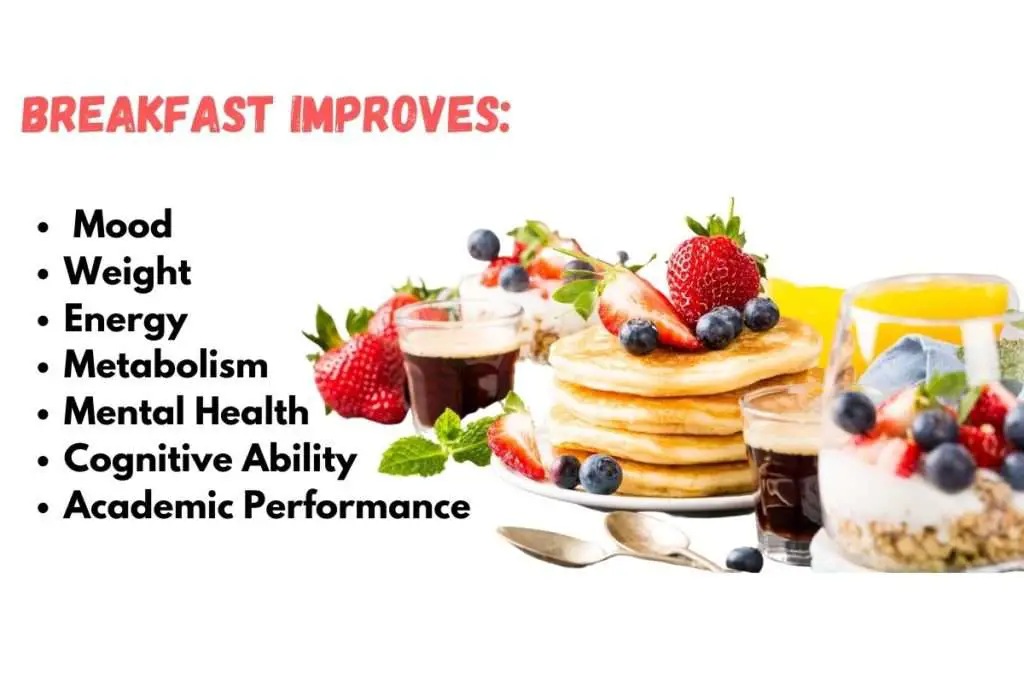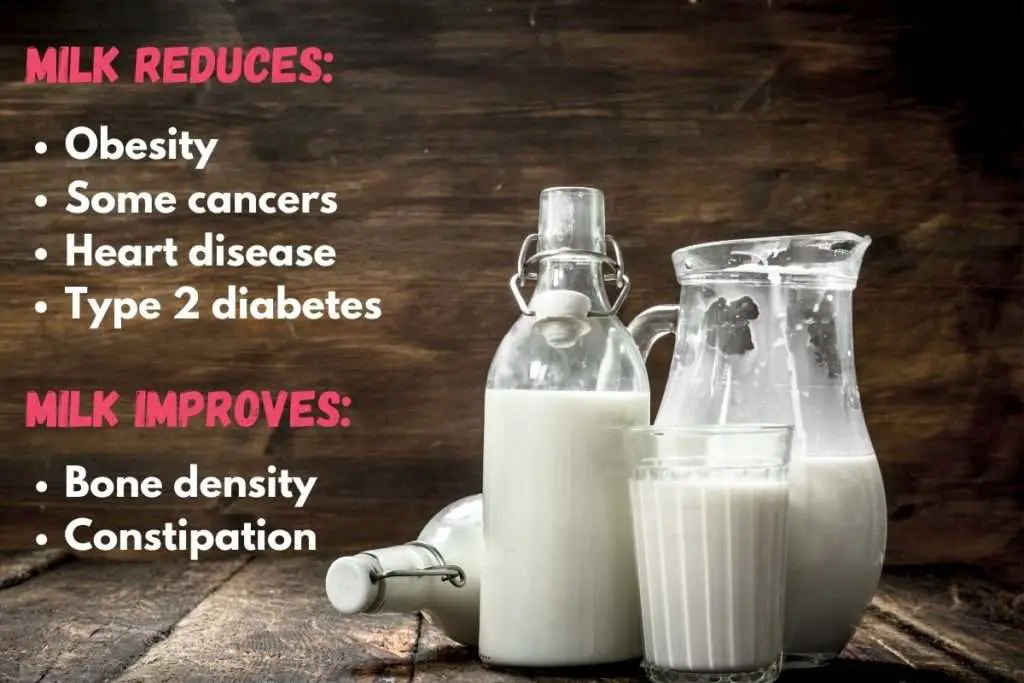We already know breakfast is essential. Now, let’s finally figure out how to give it the time, energy and respect it deserves.
93% of Americans believe that breakfast is still the most important meal of the day. Yet, only 44% of persons actually eat breakfast. In fact, many persons are misinformed about what a healthy breakfast really is.
These are some very surprising statistics to know about breakfast. Aren’t they?
Another study shows that approximately 25 % of adults and 36 % of teenagers skip this meal (Ferrer-Cascales et al., 2018). Regardlesss, these numbers indicate a very intriguing probability.
That is, most persons simply believe that breakfast is not worth the time, effort or cost it takes to prioritize this essential meal.
Luckily, in just moments you’ll find out the best nutrition tips and all the important facts that you need to know about breakfast.
As such, not only will this post convince you of the health benefits of breakfast, but you’ll get the information you need to make the first meal of the day as healthy and optimal as possible.
Read on…
- We already know breakfast is essential. Now, let's finally figure out how to give it the time, energy and respect it deserves.
- Why is a healthy breakfast important?
- Does it really matter what I eat for breakfast?
- What should I know about what to eat for a healthy breakfast?
- How many slices of bread should I consume?
- What should I know about breakfast timing?
- What should I know about time-restricted eating?
- How long after breakfast should I eat lunch?
- What about brunch?
- What should I know about overeating?
- What should I know about foods to avoid for breakfast?
- What should I know about foods to eat for a healthy breakfast?
- What should I know about healthy breakfast drinks?
- What should I know about fruit juice for breakfast?
- What other beverages should I limit for a healthy breakfast?
- What should I know about milk and diary for breakfast?
- How much milk is enough?
- What if I'm lactose intolerant?
- What about supplements?
- Here's a quick summary on all you need to know for a healthy breakfast:
- Final words about having a healthy breakfast?
- How to create a personal wellness plan?
- What are the best foods to eat for a healthy diet?
Why is a healthy breakfast important?
Fortunately, there have been numerous studies relating to the benefits of breakfast.
There’s what the evidence indicates about the advantages of eating a healthy breakfast:
- Mood improvements
- Better mental health
- Lower incidences of depression
- Energy level increases, particularly in adolescents
- Lower consumption of fats throughout the day
- Boosted metabolism
- Improvement in cognitive ability and academic performance
- Decreased incidence of heart disease and obesity
In fact, one study showed an increase of approximately 27 % in coronary heart disease in persons who skipped breakfast. Moreover, skipping breakfast often leads to overcompensation by eating more, or even two portions of dinner, which associates with various adverse health consequences.
I think that’s more than enough reasons for you to think twice the next time you decide to skip breakfast.
Does it really matter what I eat for breakfast?
It surely does matter what you eat for breakfast. Numerous studies suggest that a poor, unhealthy breakfast may be even worse than no breakfast at all.
In fact, a breakfast high is fats has recently been demonstrated to increase the incidence of heart disease and atherosclerosis (Ferrer-Cascales et al., 2018).
Unfortunately, many of the foods that you consider healthy, may contain way too much sugar.
Exceeding daily sugar intake…
Research highlighted that there is a growing concern relating to the amount of children who exceeded the total daily sugar intake recommendation after eating only breakfast.
Even more surprising was the fact that 84% of their parents considered their children’s breakfast to be healthy.
This statistic made me remember a famous quote by Daniel Boorstin which states that “The greatest enemy of knowledge is not ignorance, it is the illusion of knowledge.
And that’s exactly why you need to be in constant pursuit to increase your knowledge and insight.
Unfortunately, when it comes to your personal health and wellness, ignorance is not bliss and your body will reap the undesired consequences regardless.
What should I know about what to eat for a healthy breakfast?
According to experts, breakfast should account for about 15 to 25% of your daily intake.
Firstly, try to make sure it is well balanced. Cereals, fruits, lean meats, oatmeal, smoothies, toast, fruits, vegetables, quinoa, eggs and low-fat milk are great choices.
Additionally, try to plan your breakfast ahead of time to make sure you don’t just grab the first thing you see.

"Every time you eat or drink, you are either feeding disease or fighting it." - Heather Morgan, MS, NLC
How many slices of bread should I consume?
Another essential aspect you need to know about breakfast is relating to the consumption of bread. Many persons consume bread religiously, even if they are worried about the health benefits.
But, contrary to popular belief, there is no real evidence that bread is bad. In fact, there are several advantages, especially if you decide to opt for healthier varieties such as whole grains.
The exact amount of bread you should consume depends on several factors including age, gender and lifestyle.
However, the daily recommendation is 6 to 11 servings of grains for adults. Notably, one serving is roughly equivalent to one slice of bread, half bagel or half cup pasta or rice (Cleveland et al., 1997).
But, I’d recommend staying to the lower end if your lifestyle is sedentary.
What should I know about breakfast timing?
When it relates to the timing for breakfast, my best advice is, as much possible, to try to eat at consistent times.
In fact, your metabolism may suffer from even small variations in your eating schedule. However, try to remain within an hour or two of waking up, even on weekends.
What should I know about time-restricted eating?
Another thing that you may want to consider is that time-restricted eating has shown very positive results relating to the reduction of weight.
This is due to the influence that time-restricted eating has on the hunger hormones and appetite.
In fact, regardless of the weight-loss benefits, time-restricted fasting of 12 to 16 hours may be helpful for reducing inflammation, stress, and gut microbiota (Paoli et al., 2019).
However, if you’d like to give time-restricted fasting a try, I recommend that you eat earlier in the evenings and not close to bedtime, so you can have a longer overnight fast.
Consequently, you won’t have to push your breakfast too late to accumulate the total number of hours.
Plus, the fact that you will need to eat earlier in the evening is a win-win situation. In fact, eating earlier in the evening also has it’s own health benefits relating to weight loss, improving sleep and boosting metabolism.
Making gradual adjustments…
However, make sure you’re not eating less than your daily caloric intake which may lead to dizziness and lack of concentration, among others are the adverse health consequences.
Additionally, don’t go overboard, start with a shorter window so your body can gradually adjust.
Please note, time-restricted eating is not recommended for everyone so make sure you consult your physician.
Specifically, if you are pregnant, breastfeeding or suffer from some health conditions such as diabetes you should definitely stay away from time-restricted eating.
How long after breakfast should I eat lunch?
Typically, you should consider eating lunch approximately 4 to 6 hours after your breakfast.

"Your body is your temple. Keep it pure and clean for the soul to reside in." - B.K.S IYENGAR
What about brunch?
I would say let’s skip it. Why? Because eating less frequently and no snacking have been associated with better health outcomes.
So, you definitely shouldn’t make brunch customary and certainly make sure it’s not the size of an entire meal (Kahleova et al., 2017).
What should I know about overeating?
Eating practices are greatly influenced by their immediate gratification. As such, self-control is essential because of the time difference between the behavior and the adverse consequences of overeating.
For instance, you may turn to food because you find it comforting. Thus, immediately, you’ll likely have a stress relief.
However, the weight gain and most of the negative health outcomes will likely not occur until much later.
Some persons overeat without even realizing it, often when they are distracted.
However, whether your overeating is due to a particular stimuli, feeling or stress, the techniques below will help you curb this unhealthy habit (Ferster, et al., 1996).
Here are some tips to help you control your overeating
| Steps to manage overeating | Tips and strategies |
|---|---|
| Assess what influences your eating | Identify HOW, WHEN, WHERE and WHY you overeat. Determine your baseline total daily consumption. |
| Determine what can be changed | Remove distractions during meals. Avoid snacking. Only eat at specific times. Determine specific serving sizes. Avoid purchasing certain foods. Prepare healthy substitutes. Drink more water. |
| Identify the consequences | Identify short and long-term effects on physical and mental health. |
| Develop techniques for self-control | Be mindful. Measure your progress. Avoid temptation. Set realistic expectations. Manage stress, medications and concomitant diseases. |
For an additional guideline, be sure to check out this post on self-discipline.
What should I know about foods to avoid for breakfast?
Essentially, eat less salt and sugary foods. avoid white bread and fried foods. Additionally, choose the type and quantity of your carbs wisely.
Also, be wary of those processed and packaged foods that do have some healthy ingredients but are loaded with sugars and other unhealthy additives.
What should I know about foods to eat for a healthy breakfast?
As much as possible, you should definitely try to increase your intake of fiber.
Increasing proteins in the morning has also been shown to be beneficial.
Moreover, all fat is not bad fat. In fact, unsaturated fats such as seeds, fish, whole grains and omega 3 fatty acids are necessary to reduce cholesterol levels, inflammation and your risk of heart disease.
Since you’re recommended to consume at least 5 servings of vegetables and fruits daily, you should definitely get started at breakfast. Unfortunately, only 25 % of the population actually adheres to this recommendation (Skerret & Willett, 2010).

"I totally regret eating healthy today - Said no one ever." - Unknown
What should I know about healthy breakfast drinks?
Both tea and coffee have been shown to be beneficial for weight loss, alertness, migraine, cognitive performance, improving metabolism and decreasing the risk of diseases.
Daily coffee consumption…
According to research, two cups of coffee daily have been linked to decreased suicide rates; suggesting that it has an anti-depressant effect. However, due to the diurnal rhythm, it should be avoided early in the morning and instead consumed between 9 to 11 am and 1 to 5 pm (Charles Spence, 2017).
Although, non-pregnant adults could drink as much as 400 mg of coffee. That’s an equivalent of 4 cups (each of 8 ounces daily) of coffee. However, pregnant women and adolescents should not exceed one cup daily.
However, if you opt for coffee try using in moderation and watch the associated sugar intake due to the possibly of difficulty sleeping, nervousness, irritability and increased heart rate.
What should I know about fruit juice for breakfast?
Although fruit juice was once viewed as good for your health, increasing studies are showing that it can be just as bad as soda. In fact, too much juice adds calories and sugars.
And, unfortunately, higher sugar intake is associated with an increased incidence of heart disease and stroke. Additionally, drinking juice at breakfast may be associated with greater incidence of obesity.
This doesn’t mean that you need to cut out fruit juice all together. Fruit juice does provide the nutrition you may be missing especially if you don’t consume enough fruit.
Notably, research has also shown that moderate consumption of 100 % fruit juice of approximately 5 ounces daily is associated with a lower risk of stroke, heart disease and cognitive decline (Guasch & Hu, 2019).
So everything in moderation please!
What other beverages should I limit for a healthy breakfast?
According to Skerret & Willett (2010), beverages that you should avoid or limit include soda, sports drinks and alcohol. Shockingly one single can of cola contains 8-10 teaspoons of sugar.
The average daily sugar intake recommendation is 6 teaspoons for women and 9 for men. So, it’s very clear why you should avoid soda, not only for breakfast but throughout the day (Skerret & Willett, 2010).
What should I know about milk and diary for breakfast?
It is often argued whether milk should be avoided. Although some persons question the dietary importance of milk, there is no strong evidence to avoid them.
Notably, milk contains numerous essential nutrients and boasts several health benefits.
In fact, consuming milk is linked to reduced incidence of obesity, heart disease, type 2 diabetes, some forms of cancers and increased bone density.
Since milk is a high source of protein, which is highly satiating, it decreases your chances of overeating (Thorning et al., 2016).
However, if possible, opt for low fat.

“Eat breakfast like a king, lunch like a prince, and dinner like a pauper.” - Adelle Davis.
How much milk is enough?
In many territories, the recommendation for dairy is three servings daily. However, this does not mean you need 3 portions of milk since you can also substitute with one or more portion(s) of yogurt and/or cheese.
However, you should remember that milk interferes with the absorption of some medications including some types of antibiotics and iron supplements.
Particularly for iron supplements, these should be taken at least 2 hours after consuming milk. As such, be sure to consult your healthcare provider if you do take any medications.
What if I’m lactose intolerant?
This is a very important question since as much as three quarters of the world’s population may be lactose intolerant.
Consequently, many persons experience stomach pains, loose stools and gassiness due to their inability to adequately digest the lactose in milk.
However, most of these individuals may be able to tolerate a very small amount of lactose.
Additionally, you may consider using other alternatives such as fermented products like yogurt and some types of cheese such as cottage cheese, which are usually more easily digested, if lactose intolerant (Thorning et al., 2016).
What about supplements?
Supplements play a vital role in achieving optimal health. However, in most cases supplements should optimize- and not replace- dietary intake. It’s also important to note that some supplements may interact with other medications.
Specifically relating to calcium supplements, dietary absorption is usually much better than with the supplements.

“All happiness depends on a leisurely breakfast.” ‒ John Gunther.
Here’s a quick summary on all you need to know for a healthy breakfast:
- Breakfast is as important as we believe and has numerous health benefits.
- An unhealthy breakfast may be worse than no breakfast at all.
- Make your breakfast as healthy as possible by decreasing sugars and unhealthy fats, and increasing grains and fruits.
- Try to stick to a regular breakfast schedule, even on weekends.
- Time-restricted eating has been shown to be beneficial.
- Consider milk, if tolerable.
- Coffee and tea does have numerous health benefits.
- Breads are fine but stick to different grains, avoid white bread and use in moderation.
- Fruit juice should be 100% juice and the maximum amount should be 8 ounces per day.
- Be aware of the risks and consequences of overeating and implement the strategies for optimal control.
Related Article: List of the Best Foods To Eat For A Healthy Diet.
Final words about having a healthy breakfast?
Congratulations! You just got a complete overview of everything you need to know about breakfast.
In fact, if universities handed out PhDs on breakfast knowledge, you’d have one by now! Haha.
Yes, increasing your knowledge is an accomplishment. But the truth is, packing away all this information won’t do you any good if you don’t put it to use.
And, that’s why I suggest you take action – starting right now. Because the sooner you start, the sooner you can turn this “PhD in breakfast” into real results!
Let me know if you have any additional breakfast tips in the comments below.
If you haven’t yet, be sure to check my post on physical self-care for other helpful tips and solutions.
Remember to share this if you found it useful.
Energy when you need it the most
Need a little help to get the job done? Fueled with vitamins B6, B12 and Ginseng, these tasty gummies will help you power through from morning to night.
And don’t worry! These are vegetarian friendly and free from all the nasties of artificial colors, flavors and sweeteners. Grab two and get going!
- Vitamins B6 and B12 help in energy metabolism in your body.
- Ginseng, an herbaceous perennial plant in the ivy family that’s used in Herbal Medicine to help relieve restlessness.
Related topics
How to create a personal wellness plan?
A personal wellness plan is a personalized strategy for preventing disease and promoting overall well-being.
It helps you identify ways to build personal resilience – the ability to balance between work, family, friends, community, and self.
The best thing about building your own wellness plan is that it only takes a few minutes each day to make some simple changes, which can make all the difference for your health.
The beginning of wellness starts with you! Read more
What are the best foods to eat for a healthy diet?
We can improve our personal wellness by eating foods that are nutritious and healthy, while avoiding unhealthy choices.
For instance, eating too many refined sugars and grains cause weight gain, which leads to obesity.
Conversely, healthy foods like vegetables, nuts and whole grains are linked with living a longer, healthier life. So which foods should we be eating? Read more
References
All breakfast all the time (2021) Breakfast Research & Statistics.
Charles Spence, Breakfast: The most important meal of the day?, International Journal of Gastronomy and Food Science, Volume 8, 2017, Pages 1-6, ISSN 1878-450X
Ferrer-Cascales, R., Sánchez-SanSegundo, M., Ruiz-Robledillo, N., Albaladejo-Blázquez, N., Laguna-Pérez, A., & Zaragoza-Martí, A. (2018). Eat or Skip Breakfast? The Important Role of Breakfast Quality for Health-Related Quality of Life, Stress and Depression in Spanish Adolescents. International journal of environmental research and public health, 15(8), 1781.
Ferster, C.B., Nurnberger, J.I. and Levtit, E.B. (1996), The Control of Eating. Obesity Research, 4: 401-410.
Kahleova, H., Lloren, J. I., Mashchak, A., Hill, M., & Fraser, G. E. (2017). Meal Frequency and Timing Are Associated with Changes in Body Mass Index in Adventist Health Study 2. The Journal of nutrition, 147(9), 1722–1728.
Paoli, A., Tinsley, G., Bianco, A., & Moro, T. (2019). The Influence of Meal Frequency and Timing on Health in Humans: The Role of Fasting. Nutrients, 11(4), 719.
Skerrett, P. J., & Willett, W. C. (2010). Essentials of healthy eating: a guide. Journal of midwifery & women’s health, 55(6), 492–501.
Thorning, T. K., Raben, A., Tholstrup, T., Soedamah-Muthu, S. S., Givens, I., & Astrup, A. (2016). Milk and dairy products: good or bad for human health? An assessment of the totality of scientific evidence. Food & nutrition research, 60, 32527.











